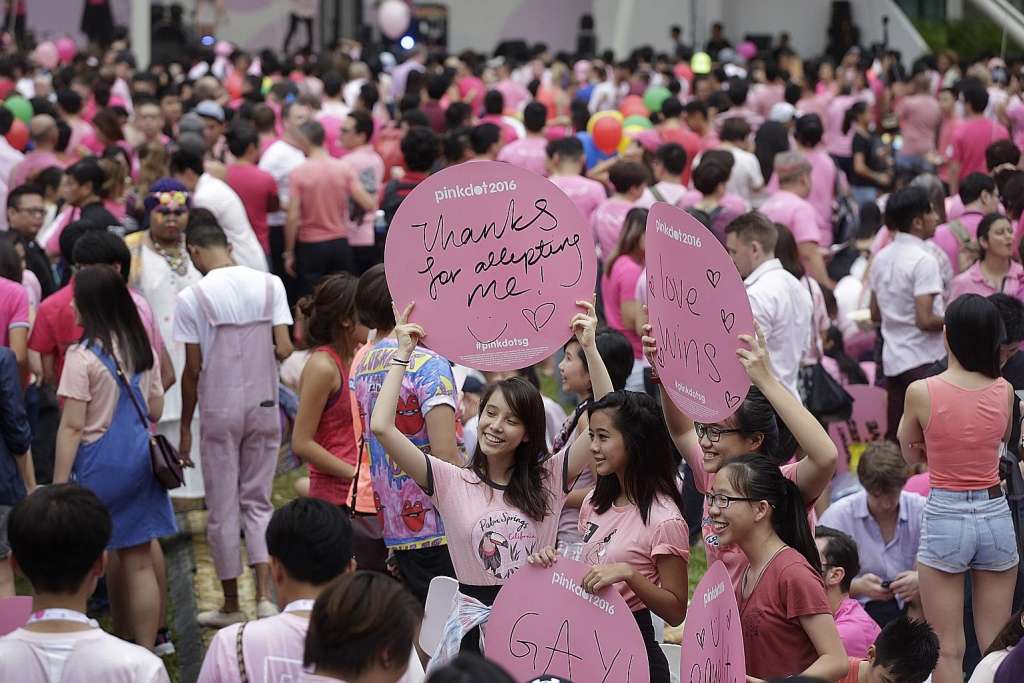It started in 2009 with just 2,500 supporters and no sponsors.
Its first sponsor, Google, came on board in 2011. This June, the Pink Dot lesbian, gay, bisexual and transgender (LGBT) rally had 18 sponsors – most of whom were foreign companies.
Then two weeks ago came a reminder from the authorities: Foreign companies need a permit to sponsor, promote, or get their employees to attend Speakers’ Corner events.
This clarification drew mixed reactions. Political observers said it was a pre-emptive move to prevent foreign money from influencing ideology here, but some activists felt it stifled civil society.
Singapore Management University law don Eugene Tan said Pink Dot was “the trigger and catalyst” for this reminder from the authorities, but the move was meant to quell foreign influences – not LGBT issues.
He said the danger is in foreign companies backing contentious issues, using money to bring prominence to a Speakers’ Corner event, and fanning the flames. For example, talking about government policies or suggesting euthanasia in an ageing society.
“The stakeholders should be Singaporeans because if tensions escalate and there is instability, the foreign companies can just up and go,” he said.
National University of Singapore political scientist Bilveer Singh agreed: “Today it is Pink Dot, tomorrow it could well be anything outsiders may want to be involved in.”
He said the political corridor here will open up and Singapore does not want money to determine the agenda. “These outsiders (foreigners), no matter how magnanimous they may appear – we do not want their values, norms, mores and whatever interest and agenda that may harm us.”
But activist for migrant worker rights Jolovan Wham believes there is no danger in foreign influence because given today’s technology “we are influenced by foreign ideas and cultures all the time”.
“The Government is worried about the expansion of our civil and political space,” he added.
Mr Leow Yangfa, executive director of LGBT counselling group Oogachaga, saw the reminder as a clampdown on LGBT groups and is worried that companies may become reluctant to support groups such as his.
The Ministry of Home Affairs, however, has maintained that it is neutral about the causes Singaporeans choose to support.
Law and Home Affairs Minister K. Shanmugam said two weeks ago: “Politics in Singapore is for Singaporeans and controversial, social, political issues are to be discussed and dealt with by Singaporeans. Foreigners cannot play a role in that.”
Meanwhile, from tomorrow Singaporean entities will be able to organise events at Speakers’ Corner in Hong Lim Park without a permit after the Government relaxed its rules. There is trust that local companies will be mindful of which topics to back since they have local shareholders and society to account to, said Associate Professor Tan.
What is interesting to note, said observers, is how the authorities will handle local non-governmental organisations with foreign affiliation, should they choose to take up political causes.
Associate Professor Singh said: “Clearly these are like multinational corporations, financially driven and assisted by their external headquarters. The challenge is – will they be ‘controlled’ by Singaporeans?”
Habitat for Humanity, for example, is an American Christian organisation which builds homes for the poor. Its Singapore arm started in 2004 and is governed by a board of local directors.
Its national director, Mr Yong Teck Meng, said the foreign link is “moral in nature, not legal”. While the organisation is faith-based, Mr Yong said it does not push its faith.
“They have no control over us,” he said.

This article was first published on Oct 31, 2016.
Get a copy of The Straits Times or go to straitstimes.com for more stories.






